- Home
- Kevin Ashman
Medieval IV - Ring of Steel Page 2
Medieval IV - Ring of Steel Read online
Page 2
Madog put up his hands for silence but the rapport between the men went on for several minutes more before gradually dying away. As it did, the original man climbed up onto the table and called for silence. The hall fell quiet as the men returned to their seats and as the noise abated, the warrior turned to face Madog.
‘Sire,’ he announced, ‘my name is Martyn of Flint and I have ridden from the army of Cynan to share in this celebration of your victory on his behalf. For more years than we care to remember, most men here have risked their lives leaning against the yolk of the English. Individually we risked death from the king’s men yet still we soured his path. Some preyed upon their supply lines whilst others ensured his forces were kept busy chasing shadows amongst the hills of our fathers.’
‘All this time we resisted alone, a broken force without a common banner between us. Though we did what we could, we knew it was a mere scratch on the armour of Longshanks and more was needed if we were to provide a true resistance. Many were the nights when men sat around the fires, praying for the time we would be united in one cause. For an age it seemed we wasted our time, yet what you have done in the last month is to mould us into a formidable army as surely as a sword smith moulds a blade. Sire, I raise my tankard to few men but here in front of these fellow warriors, I lift it now in honour of you and what you have done. Praise be to Lord Madog of Ynys Mon, warrior, leader of men, and castellan of Caernarfon Castle.’
As he lifted his tankard to drain the contents the men erupted into cheers once more as Madog’s comrade leaned across to speak into his ear.
‘Sire, I note he did not voice acknowledgement of your title. Do you want me to address this oversight?’
‘It was no oversight, Meirion,’ said Madog, ‘for he is Cynan’s man and as yet undeclared. Cynan may have pledged not to fight against me but will wait to see what transpires over the next few months before declaring allegiance. Besides, that Martyn no doubt has many comrades within this hall, we would not want to set Welshman against Welshman so soon after unifying so many.’
‘Understood,’ said Meirion and sat back as Madog got to his feet.
‘Men of Wales,’ he called, ‘Martyn of Flint. You have my gratitude for attending this day. We have indeed inflicted a dent upon the honour of Longshanks but make no mistake, in the greater scheme of things it is no more than a flesh wound. At this very moment he will be smarting from the humiliation of losing such a great fortress but do not sit upon your laurels for I can assure you that as surely as winter follows autumn, he will be gathering his strength to win back this great prize.’
‘Never,’ called out some of the men, ‘the castle is ours.’
‘It is,’ agreed Madog, ‘and I have no intention of delivering it into his hands just yet but that is the point of this assembly. You men before me are the real leaders of the people, the warriors they call on when they are dispossessed or treated unfairly. It is you who they turn to, not a prince or a crown, but the warlords they grew up admiring. All we have done here is take the fortress by surprise, aided by circumstance.’
‘And the blood of brave men,’ shouted a voice.
‘Aye,’ said Madog, ‘and that is the greatest price of all but see it not as the final outcome of this struggle, for their sacrifice is but the first step and that is why we have gathered here this day. Between us we can raise perhaps ten thousand men at arms willing to fight against Longshanks. They are to be feted and thanked for their support but make no mistake, for everyone who carries arms on our behalf there are ten more who have not committed. Some of those may harbour allegiance to Longshanks and we will never gain their support but there are many who still labour under the yolk and need help to break the bonds. These should be our next targets, not in the next few months but in the next few days. The hill before us is steep and we need every sword arm we can get to continue the struggle so I say this. Despatch what men you can to act as recruiters in my name. Tell them to report to a designated place of your choosing and for every man taking up the call, I ask that he is paid the sum of a silver penny for food and drink.’
‘Since when do we buy allegiance?’ asked Martyn.
‘It is not for allegiance,’ said Madog, ‘but if we are asking men to leave their ploughs, they will need to be able to feed their kin. It may not last long but the other families will need to help those who have sent their sons to the cause.’
‘Assuming that many heed the call,’ said Martyn, ‘we cannot maintain such a force for long. These men will need to be fed and watered.’
‘We will issue decrees to the villagers asking for support,’ said Madog, ‘I know they already struggle but at least this time it will be with a common goal in sight, the end of Edward’s rule.’
‘And what will be the targets of such an army?’
‘I have here some documents drawn up by my scribes,’ said Madog. ‘Each identifies a strategic target for our forces in the north and stretches as far down as Dolwyddelan. Cynan has a similar list identifying targets in the in the centre of the country down as far as Builth. Ten days from now, both armies will descend on these positions with everything at our disposal.’
‘Sire,’ said a voice, ‘the winter is almost upon us. Surely we should wait until the spring?’
‘We will not wait,’ said Madog, ‘for Longshanks will not wait. Already he has sent his own messages across England seeking recruits to his army. Luckily half his soldiers are already in France but he seeks to gather enough strength to send a force into Wales to reclaim what was his and to crush our resistance.’
‘It is a great ask to defeat the army of a king,’ said a voice.
‘It is but the size of his army is also its weakness. To maintain and supply such a force, he will need the safety of his castles. Many are alongside the coast and can be supplied from the sea so what we need to do is make them inaccessible to Edward. If his soldiers are isolated from the safety of the ring of steel then we can pick them off as the wolf takes a sheep. We grew up amongst the hills of this country and know them well. With careful planning we can terrorise his columns and disappear before they have chance to reorganise. Over time, they will grow tired of fighting the mist and retire to the safety of their castles on the English side of the dyke.’
‘And how do you intend we deny him his castles in Wales?’ asked a voice.
‘By taking them into our possession,’ said Madog. ‘The taking of Castle du Bere as well as this one at Caernarvon, the greatest of them all, proves it can be done. Yes, we had good fortune on our side but now we are stronger and more organised, I see no reason why we cannot wrest the fortresses from his control. Many are understrength as the garrisons have been withdrawn to fight in France so pitched battles will be unlikely, however the walls are mighty and will need to be breached.’
‘A mighty task in itself,’ said a voice.
‘But not impossible,’ said Madog. ‘Already we have identified engineers across the country and as we speak, they are assembling the trebuchets we will need for the assaults.’
The room broke into conversation and Madog allowed them the time to discuss the details, knowing the whole thrust of his plan needed the support of the men in front of him. Finally one man stood and waited for the noise to die down. Madog looked over and recognised Dafydd Merchant, a noble from the west coast of the country.
Madog held up his hand and eventually the last of the noise died away.
‘Lord Merchant,’ said Madog, ‘welcome to my hall. You have the floor.’
‘Lord Madog,’ said Dafydd, ‘what you have achieved in the taking of this castle is indeed impressive and thought impossible by many men. However it has to be said that now the English are aware of your prowess, they will surely double their defences. To ask us to throw ourselves against their walls is to ask many to die not knowing if their deaths will be enough to stop the main army.’ He paused. ‘That being said, I have never felt such an upsurge in fervour against the king. Just to be amongst such men in thi
s hall is to bring the blood to a boil and set a man charging against a castle wall. For many long years we have knelt before the fist of Edward, always talking about the day when we will once more stand proud. Well I believe that day has arrived for there will be no greater chance than this.’ He paused and looked around the room before returning his gaze to Madog. ‘I pledge allegiance to your cause, Sire and will raise an army of a thousand men before this month is out. In addition I will arm them and furnish whatever food is needed from my own cantrefs. This is my pledge.’
To a great roar the man sat down and Madog looked around the room. His eyes fell upon Morgan Talbot, a Warlord from Mid Wales. Morgan was a renowned fighter and his allegiance would go a long way to capturing the support of the rest.
‘Morgan Talbot,’ said Madog, ‘do you have something to say?’
‘Aye, I do,’ said Morgan, ‘I have kept my counsel and watched from afar, for many have chanced their arm against the English before but all have failed. It would be better if you and Cynan stood shoulder to shoulder in this matter for united we are stronger. However, I understand his reluctance and know he will be like a deer hound on the flanks of the English, so I say this. We can wait for ever more for circumstance to be in our favour yet no one can foresee the future. Look around you, men of Wales. Within these four walls sits every man of note from here to Builth and even though some have their doubts, the fact that you have come here demonstrates a longing to resolve our fate. Yes there are more questions than answers, but I say this is our only chance. So, Madog, Lord of Ynys Mon, I too will pledge my men and my resources to the fight and encourage everyone present to do the same. Act now, men of Wales or keep your bleating for the safety of your own hearths.’
He sat down, again to a mighty roar. Another stood up from the crowd and as the noise abated, he made his decision.
‘Sire, I am as one with Morgan Talbot. My men are your men.’
One by one all the most powerful warlords in the room stood to pledge allegiance until finally there were no more left. Madog got to his feet.
‘Countrymen,’ he said. ‘My heart is gladdened at your resolve. But this is not about me or you, it is about our children and their children. Let the commitment in this room be the bedrock upon which freedom is built. Let free Welshmen generations from now look back on this day and tell stories about the night when a gallant few pledged to wrest their country from the grip of a tyrant. This day will be your legacy, this day and the freedom of Wales.’
For the last time the room erupted in cheers and this time did not abate. At a signal from Meirion, the doors swung open and lines of serving wenches walked in carrying trays of tankards.
Madog sat back alongside Meirion as the celebrations began.
‘Well,’ said Meirion, ‘that went as well as you could have hoped.’
‘It did,’ said Madog, ‘and for the first time since we took the castle I once again enjoy confidence in our cause.’
Meirion looked around the room.
‘It looks like this could get a bit messy,’ he said.
‘Let them celebrate, Meirion,’ said Madog, ‘for by the time this is over, I wonder how many of us will remain to see such times.’
----
Chapter Three
Brycheniog
Fletcher sat in the chair next to the hearth, warming his weary bones against the chill of the evening air. His wife sat in the corner, sewing patches onto worn clothing by the light of a single candle. On the flames of the fire, a diced hare complete with bones lay simmering in a pot along with onions and turnips, a meal meant to last them for at least three days. Half a loaf of bread lay to one side and the man leaned forward to pick off the stale edge before throwing it into the pot. Nothing was wasted in these hard times.
‘I’ll see if I can find some late roots tomorrow,’ said his wife, Marian, ‘with the dried apples from the dry store we can probably make it last a few extra days.’
‘I need to collect some wood for the fire,’ answered fletcher, ‘and reset the snares, you never know, we may get lucky.’
Marian got up and walked over to put her arms around the shoulders of her husband.
‘Don’t worry, Fletcher, ‘she said, ‘another two days and I’ll have the next basket from the manor. Perhaps I can persuade the cook to let us have some stew bones, there’s always some meat left on them and the marrow is good for your blood.’
‘It’s just as well you are in gainful work,’ said Fletcher, ‘it has been a poor harvest and the store has too many empty barrels. Even though your payment is meagre, I foresee it will be your work in the manor’s kitchens that will see us through this winter.’
‘God will provide,’ she said, hugging him tighter as she stared into the flames. For a few moments they stayed that way until the moment was interrupted by a loud knock on the door.
‘Oh,’ said Marian standing up, ‘who can that be for it is already dark?’
‘I will see,’ said Fletcher and groaned as he got up from the solid wooden chair.
‘Be careful,’ said his wife, ‘it could be anyone.’
‘You fret too much woman,’ said Fletcher, ‘brigands don’t knock doors they crush heads on lonely paths.’
‘Still,’ she said, ‘be it is always good to be wary.’
‘Who calls at this hour?’ asked Fletcher through the door.
‘Sir, it is a family friend from your past, seeking shelter from the rain and perchance a crust from your plate.’
‘Name yourself, traveller,’ said Fletcher, ‘for times are tough and hospitality is hard to give.’
‘My name is Geraint,’ said the voice, ‘and I grew up alongside your daughter.’
Fletcher’s brow furrowed as he strained to recall the name but Marian stepped forward and laid her hand on her husband’s shoulder.
‘Fletcher, if he speaks true then I know who he is.’
‘I don’t remember anyone called Geraint,’ said Fletcher.
‘You should,’ said Marian, ‘it is the brother of Garyn Ap Thomas.’
----
Fletcher stared into his wife’s eyes for a moment.
‘Turn him away,’ said Marian, ‘we want nothing to do with that family.’
‘Marian, since when do we turn away those who we know?’
‘Since his brother deserted our daughter,’ snapped Marian, ‘why should we now give his family succour?’
‘Because he may be able to help Elspeth.’
‘What could he possibly do? Unless he is now a noble who can defend our daughter before the court of the people then I don’t see how he can help.’
‘I don’t agree,’ said Fletcher, ‘and I will explore every opportunity to find a way out of our plight.’
‘Don’t open that door, Fletcher,’ said his wife, ‘it may not even be him, it could be a trick.’
Fletcher turned back to the door.
‘If it is truly you, Geraint,’ he said, ‘what did your brother leave for my daughter when he went to the Holy Land?’
For a moment there was silence as the person thought about the answer but finally the reply came.
‘A poem,’ said the voice, ‘declaring his love for Elspeth.’
Fletcher looked at Marian.
‘Well?’ he asked.
‘Anyone could know that,’ she said, ‘send him away to return when it is light. At least his visit will be witnessed.’
Her husband paused but finally turned to lift the locking bar on the door
‘Fletcher!’ warned the woman.
‘Be quiet, wife,’ said Fletcher, ‘this is man’s business.’ He opened the door and looked into the hooded face of a figure blowing into his hands against the cold night air. Behind him stood another figure similarly clothed.
‘Geraint,’ asked Fletcher, ‘is it truly you?’
The man pulled down the hood as Marian lifted a candle to see over her husband’s shoulder.
‘Well, young man,’ said Fletcher eventually, ‘
you have certainly aged but those features are unmistakable you are the image of your father. Come into the warm.’ He stood to one side as the men entered and stamped the early snow from their boots. ‘Marian, get some blankets, Geraint, remove your cloaks and get close to the fire, you look half frozen.’
‘We were caught in the rainstorm earlier,’ said Geraint, his voice shaking from the cold, ‘and as soon as the sun went down the winter winds fell upon us like a hammer does an anvil. I did not intend to put you out but feared we may not last the night.’
‘What about the tavern?’ said Marian coldly, walking back into the room, ‘there are lodgings to be had there and they are better placed to offer food.’
‘Marian, that is enough,’ snapped Fletcher, ‘these men are now our guests and will not be made to feel beholden.’
‘We cannot risk the tavern,’ explained Geraint, ‘our purpose here must remain hidden from as many as possible lest we are imprisoned.’
‘So are you outlawed as is your brother?’ asked Marian.
‘My lady, we are not but we are about business that would see us enchained by the English and perchance, lose our heads into the bargain.’
‘And what business is so perilous?’
Geraint glanced at his comrade before turning back to face the couple.
‘Ordinarily we would protect you from this knowledge,’ said Geraint, ‘but as it involves your family, you have a right to know. Allow us to thaw our bones and I will lay the story before you. Is that acceptable?’
‘Of course,’ said Fletcher, ‘and your timing is opportune for there is a cawl upon the fire. Warm yourselves first and then we will take care of your insides. When the chills have been banished, you can share your tale.’
The two men set about removing their sodden clothes and wrapped the sheepskin blankets about them. Marian scooped out some of the hot broth from the bowl into tankards and they sipped it gratefully until the warmth returned to their extremities. When they had warmed up enough to relax, Marian fished chunks of turnip and meat from the cawl pot to fill two wooden bowls. She handed them over before adding the last of the bread.

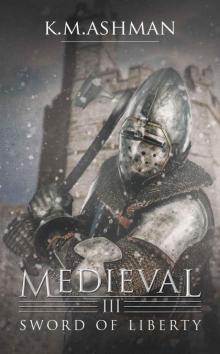 Medieval III - Sword of Liberty
Medieval III - Sword of Liberty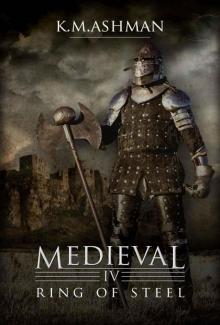 Medieval IV - Ring of Steel
Medieval IV - Ring of Steel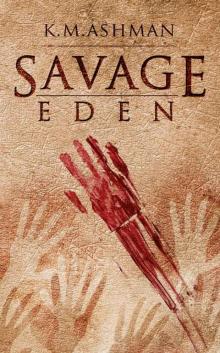 Savage Eden
Savage Eden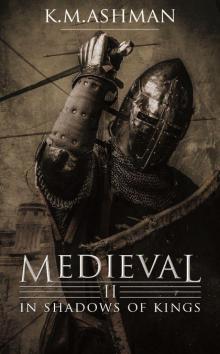 Medieval II - In Shadows of Kings
Medieval II - In Shadows of Kings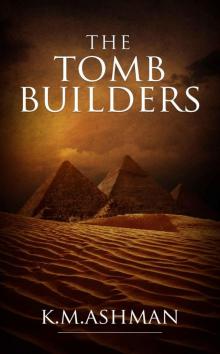 The Tomb Builders
The Tomb Builders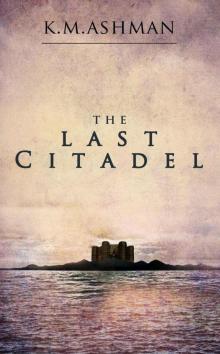 The Last Citadel
The Last Citadel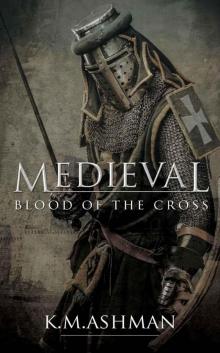 Medieval - Blood of the Cross
Medieval - Blood of the Cross Vampire
Vampire Roman
Roman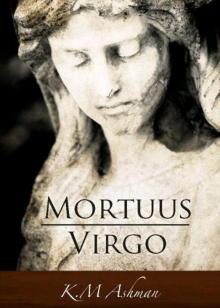 Mortuus Virgo
Mortuus Virgo